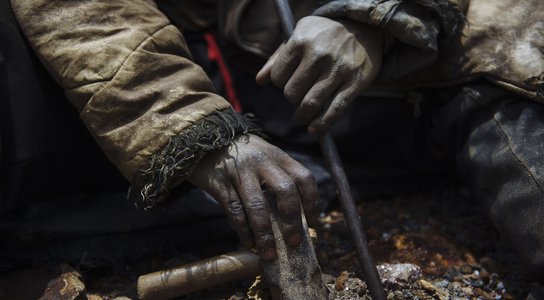The Democratic Republic of Congo is in crisis. Its leader, President Joseph Kabila, refused to step down in December 2016 at the end of his constitutionally mandated two-term limit. The country’s security and human rights situation has since been in decline.
In Congo’s restive eastern provinces, members of the national army have long vied for positions of control over areas endowed with lucrative mineral reserves. While they are officially forbidden from participation in the minerals trade, the illicit involvement of officers of all ranks has been well documented for decades.
In August 2017, the UN alleged that Major-General Gabriel Amisi Kumba, one of the country’s most powerful figures, is personally profiting from the gold sector in the eastern Tshopo province. Amisi – on European Union and United States sanctions lists since December 2016 – has a long record of serious human rights abuses in Congo, and was suspended by the president in 2012 for selling arms to poachers and militias.
A new Global Witness investigation shows that that another senior army officer, Brigadier-General Etienne Mbunsu Bindu, appears to control a 30% cut in gold production – potentially worth tens of thousands of dollars per year – from a company operating at a mine in North Kivu province. Like Amisi, this is by no means the first time Bindu’s involvement in the minerals trade has been exposed. Global Witness first wrote about him back in 2009.
The case comes as Congo’s mining law is up for review in parliament and risks being stripped of a critical part of its conflict of interest provision. This provision forbids political actors and other senior decision-makers – including members of the army, like Amisi and Bindu – from holding mining rights or trading minerals. It enshrines in law the principle that power must not be abused for private gain.
As Bindu and Amisi’s cases show, this conflict of interest provision must be maintained, fully enforced and strengthened.
Contacts
You might also like
-
Campaign Democratic Republic of Congo
The Democratic Republic of Congo (DRC) has an immense wealth of natural resources. But instead of driving development, these riches are benefiting predatory elites, armed groups and cowboy firms.
-
Press release Senior Congolese army officer receiving major slice of gold production from mining company with consent of court
A mining company in eastern Democratic Republic of Congo is ceding one third of its gold production to the son of a senior army officer
-
Report River of Gold
How the state lost out in an eastern Congo gold boom, while armed groups, a foreign mining company and provincial authorities pocketed millions